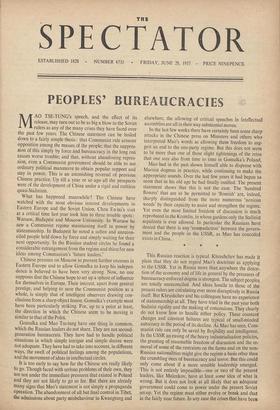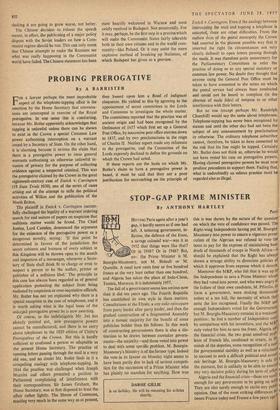PEOPLES' BUREAUCRACIES
MAO TSE-TUNG's speech, and the effect of its release, may turn out to be as big a blow to the Soviet rulers as any of the many crises they have faced over the past few years. The Chinese statement can be boiled down to a fairly simple thesis : that Communist rule arouses opposition among the masses of the people; that the suppres- sion of this simply by force and bureaucracy in the long run causes worse trouble; and that, without abandoning repres- sion, even a Communist government should be able to use ordinary political manceuvre to obtain popular support and stay in power. This is an astonishing reversal of previous Chinese practice. Up till a year or so ago all the prospects were of the development of China under a rigid and ruthless quasi-Stalinism.
What has happened meanwhile? The Chinese have watched with the most obvious interest developments in Eastern Europe and the Soviet Union. Chou En-lai's visit at a critical time last year took him to three trouble spots : Warsaw, Budapest and Moscow University. In Warsaw he saw a Communist regime maintaining itself in power by statesmanship. In Budapest he noted a sullen and unreCon- ciled people held down by force and simply waiting for their next opportunity. In the Russian student circles he found a considerable estrangement from the regime and thirst for new ideas among Communism's 'future leaders.'
Chinese pressure on Moscow to prevent further excesses in Eastern Europe and to allow Gomulka to keep his indepen- dence is believed to have been very strong. Now, no one supposes that the Chinese hope to set up a sphere of influence for themselves in Europe. Their interest, apart from general prestige, and helping to save the Communist position as a whole, is simply that of intelligent observers drawing con- clusions from a sharp object lesson. Gomulka's example must have been particularly striking. For, up to a point at least, the direction in which the Chinese seem to be moving is similar to that of the Poles. , Gomulka and Mao Tse-tung have one thing in common, which the Russian leaders do not share. They are not second- generation bureaucrats. They have had to handle political situations in which simple intrigue and simple decree were not adequate. They have had to take into account, in different ways, the swell of political feelings among the populations, and the movement of ideas in intellectual circles.
It is too early to say how far the Chinese are really likely to go. Though faced with serious problems of their own, they are not under the immediate pressures that existed in Poland and they are not likely to go so far. But there are already many signs that Mao's statement is not simply a propaganda operation. The abandonment of all but final control in Tibet, the admissions about party misbehaviour in Kwangtung and elsewhere, the allowing of critical speeches in intellectual assemblies are all in their way substantial moves.
In the last few weeks there have certainly been some sharp attacks in the Chinese press on Ministers and others who interpreted Mao's words as allowing them freedom to sug- gest an end to the one-party regime. But this does not seem to be more than one of those slight tightenings of the reins that one sees also from time to time in Gomulka's Poland.
Mao had in the past shown himself able to dispense with Marxist dogmas in practice, while continuing to make the appropriate sounds. Over the last few years it had begun to seem that in his old age he had finally ossified. The present statement shows that this is not the case. The 'hundred flowers' that are to be permitted to 'flourish' are, indeed, sharply distinguished from the more numerous 'noxious weeds' by their capacity to assist and strengthen the regime. Yet even the most limited freedom of discussion is much reprobated in the Kremlin, in whose gardens only the Stalinist aspidistra is ever allowed. In particular the Russians have denied that there is any 'contradiction' between the govern- ment and the people in the USSR, as Mao has conceded exists in China.
This Russian reaction is typical. Khrushchev has made it plain that they do not regard Mao's doctrines as applying to the USSR. Yet in Russia more than anywhere the distor- tion of the economy and of life in general by the pressures of bureaucracy-enforced dogma is strongest. The subject peoples are totally unreconciled. And ideas hostile to those of the present rulers are cirbulating ever more disruptively in Russia itself. But Khrushchev and his colleagues have no experience of statesmanship at all. They have tried in the past year both Stalinist rigidity and the making of concessions. They clearly do not know how to handle either policy. These constant changes and constant failures are typical of small-minded autocracy in the period of its decline. As Mao has seen, Com- munist rule can only be saved by fleNibility and intelligence. In the USSR an easing of the heavy industrialisation policies, the granting of reasonable freedom of discussion and the re- moval of some of the restraints on the farms and on the non- Russian nationalities might give the regime a basis other than the crumbling ones of bureaucracy and terror. But this could only come about if a more sensible leadership emerged. This is not entirely impossible—one or two of the present leaders, like Malenkov, have at least some idea of what is wrong. But it does not look at all likely that an adequate government could come to power under the present Soviet set-up. Yet the regime must either evolve or break and that in the fairly near future. In any case the crises that have been shaking it are going to grow worse, not better.
The Chinese decision to release the speech means, in effect, the publicising of _a major policy dispute with the Soviet leaders on how a Com- munist regime should be run. This can only mean that Chinese attempts to make the Russians see what was really happening in the Communist world have failed. The Chinese statement has been most heartily welcomed in Warsaw and most coldly received in Budapest. Not unnaturally. For it may, perhaps, be the first step in a process which will make the Communist States fairly tolerable both to their own citizens and to the world com- munity—like Poland. Or it may assist the more explosive method of breaking up Stalinism, of which Budapest has given us a preview.



































 Previous page
Previous page